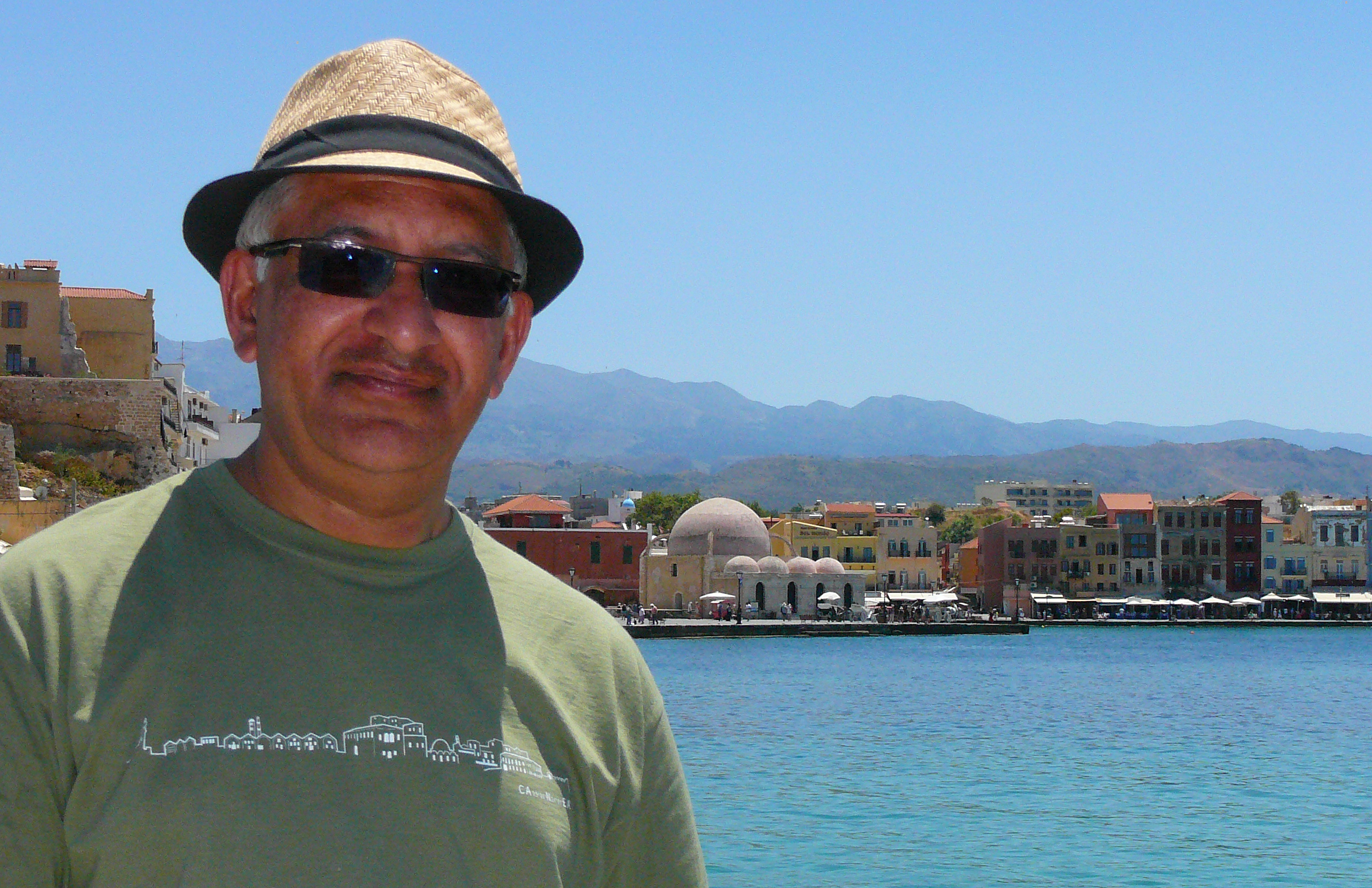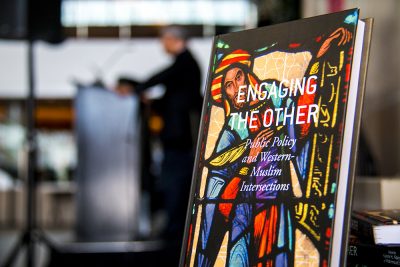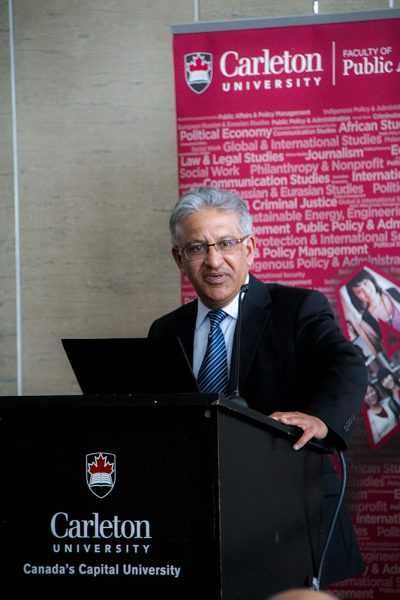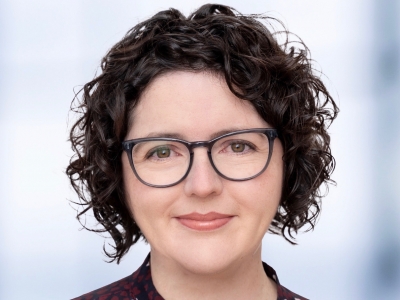Karim H. Karim, a communication professor in the School of Journalism and Communication, was awarded the designation of Chancellor’s Professor effective July 1.
“On behalf of Carleton University, I offer my congratulations to Dr. Karim H. Karim on this prestigious appointment,” said Provost and Vice-President (Academic) Jerry Tomberlin. “The positive impact of his outstanding research and service on Carleton and the broader community richly merit this recognition.”
The designation is the highest honour given by Carleton University for scholarship of outstanding merit with substantial international impact, research leadership and continued active participation in the development of research excellence.
“We are very proud of the incredible work Dr. Karim has done over his 23-year career at Carleton,” says Brenda O’Neill, Dean of the Faculty of Public Affairs. “His interdisciplinary research on communication patterns of diasporas, Muslims in the contexts of communication and culture and intercultural relations has had a significant international and cultural impact.”

Professor Karim is an internationally renowned expert and leader in global communication, diaspora and media studies. He joined the School in 1998 after working as a news agency journalist and as a researcher in the federal department of Canadian Heritage.
“Dr. Karim’s research has had broad and significant impact, shaping academic scholarship and critical public policy conversations in Canada and many other countries,” says Josh Greenberg, director of the School. “His academic leadership is evidenced not only in terms of the impact of his published scholarship, but also his contributions as a leader committed to building institutional research capacity in Canada and internationally.”
Karim is director of Carleton’s Centre for the Study of Islam, which supports scholarship, engagement in the community and innovative approaches to the study of Muslims. He is cross-appointed to the Institute of Comparative Studies in Literature, Art and Culture and is faculty associate in Migration and Diaspora Studies and the Centre for European Studies. Karim also co-directed the Institute of Ismaili Studies in London, England during a two year sabbatical leave.
He has been a visiting scholar at Harvard University and a joint program of Simon Fraser University and Aga Khan University. Karim has delivered major lectures at institutions in Ahmedabad, India; Bishkek, Kyrgyzstan; Lisbon, Portugal; Manchester, England; Nairobi, Kenya and Taipei, Taiwan. He has also made presentations to Canada’s Department of Global Affairs, the U.S. State Department and the U.S. Council on Foreign Relations.
Harvard professor Ali Asani says, “Professor Karim is an exemplary scholar of international repute. He distinguishes himself for the thoroughness and versatility of his scholarship.”
Catherine Murray, a professor at Simon Fraser University, says, “He opened up the study of media and journalism in Canada to awareness of ethnic diversity and sensitivity to the intercultural ethic of care approximately ten years ahead of the norms in journalistic self-regulation around the world.”
Karim has been a principal investigator, co-investigator or collaborator for research grants totalling more than $3.2 million, including awards from SSHRC and AHRC (UK).
Publications with Lasting Impact
In 2001, Karim won the inaugural Robinson Prize for excellence in Communication Studies for Islamic Peril: Media and Global Violence, which was published before the 9/11 attacks and was updated later.
“Islamic Peril should take its place among the serious works that enlighten on how the media operate,“ remarked University of Pennsylvania scholar Edward Herman. This critically acclaimed book continues to be cited internationally, furthering a nuanced understanding of journalistic coverage and propaganda.
Karim’s work is translated into multiple languages and has reached online researchers in 142 countries. His most widely-accessed article is the co-authored Clash of Ignorance (2012).
 The multidisciplinary, co-edited volumes Re-Imagining the Other (2014) and Engaging the Other (2014) examine mutual Western-Muslim ignorance in media and policy contexts.
The multidisciplinary, co-edited volumes Re-Imagining the Other (2014) and Engaging the Other (2014) examine mutual Western-Muslim ignorance in media and policy contexts.
Karim’s most-cited publication is The Media of Diaspora (2003), a pioneering anthology. The co-edited Diaspora and Media in Europe (2018) examines socio-cultural contexts of diasporas’ uses of contemporary technologies: video conferencing, social media, messaging and telephonic platforms.
His work has enriched cultural studies with historical data and brought awareness of ethnic diversity to the study of communication. The Definition of Visible Minority: A Historical and Cultural Analysis, a paper published in 1996, garnered renewed attention with the Black Lives Matter movement’s emergence.
Karim has published numerous op-eds in newspapers and articles in community media. “I occasionally can’t resist the urge to tweet on media and cultural issues,” he admits.
Service in the Community
 Karim’s public engagement ranges from talks at neighbourhood venues to expert testimony at Parliament Hill.
Karim’s public engagement ranges from talks at neighbourhood venues to expert testimony at Parliament Hill.
In 2020, Karim received a Governor in Council appointment to the Canadian Government’s Independent Advisory Board on the Eligibility for Journalism Tax Measures, which reviews applications for subsidies to stabilize independent journalism.
He served as external reviewer for Notre Dame University in Lebanon. Karim has also advised Aga Khan University’s Graduate School of Media and Communications in Kenya and the University of Central Asia’s Communication and Media department.
“It is a privilege to share knowledge internationally, but particularly with colleagues in Nairobi, where I grew up,” he says.
Karim has a long-standing commitment to equity. Before coming to Carleton, he received Canadian Heritage’s Public Service Award for voluntary service as the elected co-chair of the departmental advocacy association, promoting equitable access for racialized employees. Karim was the policy officer responsible for organizing the Canadian Race Relations Foundation’s establishment. In the past year, he has contributed to Carleton’s initiatives on equity, diversity and inclusion.
He has served as a member of the Ismaili Tariqa and Religious Education Board. Karim received an award from Canada’s Clerk of the Privy Council for promoting collaboration between between Muslim, Jewish, Christian and other Canadian communities.
Research Leadership
“Dr. Karim was director of the School from 2006 to 2009 and continues to play an informal leadership role, providing mentorship to colleagues on the development of their research programs,” says Greenberg. “He is widely respected within our School and across campus for his wisdom, international experience and intellectual generosity.”
Karim has served on Faculty of Public Affairs and Carleton University committees to promote research. He says, “It is gratifying to work in an environment that is supportive of faculty members’ work.”
He has organized international scholarly gatherings, been on editorial teams of globally-renowned journals and assessed grant applications for Canadian and British scholarly bodies.
In the last two decades, he has headed several research teams. A SSHRC-funded project, “Islamic Reform in Diaspora in Canada, the US and the UK,” enabled him and his co-applicants to co-ordinate an international group of researchers. The largest research team that Karim led, for the project “Settlement Programming Through the Media,” involved five professors, eleven student research assistants and nine translators.
Karim teaches and supervises at undergraduate, master’s and PhD levels. “The most rewarding outcome is to see my students succeed at Carleton and beyond,” he says. “Some have become accomplished professors and researchers.”
Global Post-Pandemic Recovery
Karim’s work has been consistently positioned towards the goal of improving relations between peoples. He says that this remains urgent during the pandemic, which has highlighted racial inequities, and will continue to demand attention after the health crisis. Professor Murray, who has reviewed Karim’s work in scholarly journals, says, “His work is salutary for any global post-COVID-19 recovery.”
In two books currently in process — Rethinking Multiculturalism with Edward Elgar and The Clash of Ignorance and the Unmaking of the World with Palgrave MacMillan — Karim holds that the socio-political manipulation of knowledge and also of ignorance is at the root of many of our problems.
“In recent years, I have been teaching courses that examine complexities of disinformation,” says Karim. “My research endeavours now are increasingly focused on understanding what I call ‘truth’s asymmetries.’”
Wednesday, August 4, 2021 in Migration and Diaspora Studies (MDS), News, School of Journalism and Communication
Share: Twitter, Facebook



